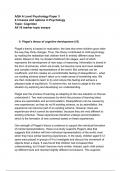AQA A Level Psychology Paper 3
4.3 Issues and options in Psychology
Topic: Cognition
All 16 marker topic essays
1) Piaget’s theory of cognitive development (16)
Piaget’s theory is based on maturation, the idea that when children grow older
the way they think changes. Thus, this theory contributed to child psychology
by making the realisation that children think in entirely different ways from
adults. Based on this, he divided childhood into stages, each of which
represents the development of new ways of reasoning. Information is stored in
the form of schemas, which are innate, but become more and more detailed
and complex mental representations of the world. But schemas can be
insufficient, and this creates an uncomfortable feeling of disequilibrium - when
our existing schema doesn't allow us to make sense of something new. We
are then motivated to learn to try and reduce this feeling and achieve a
pleasant state of equilibrium. To achieve this, we have to adapt to the new
situation by exploring and developing our understanding.
Piaget saw the process of learning as adapting to the new situation so that we
understand it. Two main processes by which the process of learning takes
place are assimilation and accommodation. Disequilibrium can be caused by
new experiences, as they do not fit existing schema, so by assimilation, the
experience can become part of an existing schema. However, there are
experiences which cannot be assimilated, because they are very different to
existing schemas. These experiences therefore undergo accommodation-
which is the formation of new schemas based on these experiences.
One strength of Piaget’s theory is evidence to support the individual formation
of mental representations. Howe et al study supports Piaget’s idea that
suggests that children will form individual representations of the world, even
when they have similar learning experiences. In the study, children aged 9-12
years were placed in groups of 4 to investigate and discuss the movement of
objects down a slope. It was found that children had increased their
understanding, but it hadn’t become more similar. Instead, each child picked
up different facts and reached slightly different conclusions. This supports
,Piaget’s theory as each child had formed an individual mental representation
of how objects move on slopes- as he would have expected.
However, one limitation of Piaget’s theory is that he underestimated the role of
others in learning. Piaget saw others as useful to learning in the sense that
they’re potential sources of information, however he saw learning itself as an
individual process, which contrasts with other theories in which learning is
seen as a more social process, supported by ‘expert’ others. In particular,
Vygotsky saw knowledge as existing first between the learner and the more
experienced other. There is strong evidence to support the idea that learning
is enhanced by interaction with others, therefore this means that Piaget’s
theory may be an incomplete explanation for learning as it doesn’t emphasise
the role of others.
A further strength of Piaget’s theory is that it has real-world applications in
teaching. Piaget’s idea that children learn by actively exploring their
environment and forming their own mental representations of the world has
changed classroom teaching. The old-fashioned classroom, in which children
sat silent in rows copying from the board, has been replaced by
activity-oriented classrooms, in which children actively engage in tasks that
allow them to construct their own understanding of the curriculum. Therefore,
this shows that Piaget-inspired approaches may facilitate the development of
individual mental representations of the world.
, 2) Piaget’s stages of intellectual development (16)
Piaget determined that there are four stages in the process of intellectual
development, all children go through all of the stages, but the age at which
they go through varies from child to child. The first stage is the sensorimotor
stage (0-2 years) and during this, children have a focus on physical
sensations and develop object permanence at 8 months, which is the idea that
things still exist even when they are out of view. They also develop the idea
that other people are separate objects and they can acquire some basic
language.
The next stage is the preoperational stage (2-7 years), where children fail to
conserve - this is the understanding that quantity remains constant even when
the appearance of objects changes. Piaget demonstrated this in his liquid
conservation procedure, where he found that when two identical containers
were placed side by side with the contents at the same height, most children
spotted that they contained the same volume of liquid. However, if the liquid
was poured into a more tall, thinner container, pre-operational children
typically believed there was more liquid in the taller vessel. Children in this
stage also display egocentrism, which is only being able to see the world from
their own perspective. Finally, children also have a lack of class inclusion, as
they fail to recognise that classifications can have subsets.
The next stage is concrete operations from 7-11 years, where most children
are now able to conserve and perform much better on tasks of egocentrism
and class inclusion. However, these are strictly concrete operations, they can
only be applied to physical objects in the child’s presence. They still struggle
to reason about abstract ideas and imagine objects or situations they can’t
see.
These abilities appear in the final stage which is called formal operations from
11 years onwards. In this stage, children are able to focus on the form of an
argument and not be distracted by its contents. This formal reasoning can be
tested using the pendulum task, in which children are asked “All yellow cats
have two heads, I have a yellow cat called Charlie, how many heads does
Charlie have?” If children correctly answer “two”, this shows they have formal
reasoning, but Piaget found that younger children became distracted by the
content of the questions and answered that cats don’t have two heads.




